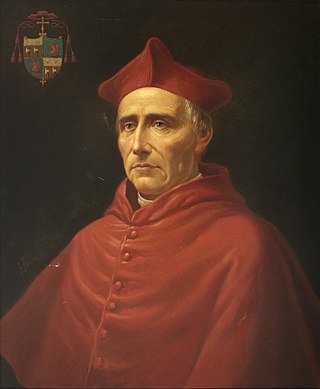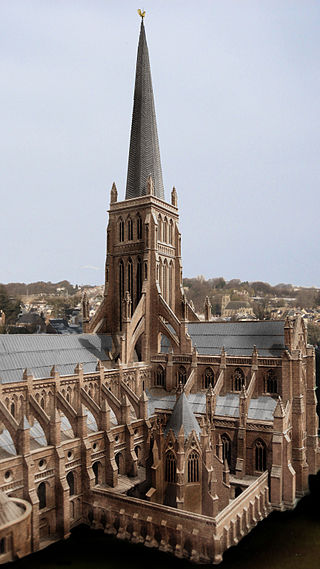Christopher Urswick (1448–1522) was a priest and confessor of Margaret Beaufort. He was Rector of Puttenham, Hertfordshire, and later Dean of Windsor. Urswick is thought to have acted as a go-between in the plotting to place her son Henry VII of England on the throne.

Rolleston on Dove, also known simply as Rolleston, is a village and civil parish in the East Staffordshire district, in the county of Staffordshire, England near Burton upon Trent. On 28 March 1983 the parish was renamed from "Rolleston" to "Rolleston on Dove". According to the University of Nottingham English Place-names project, the settlement name Rolleston could mean 'Hrothwulf's farm/settlement' or 'Hrolfr's farm/settlement'. The 2011 census for Rolleston returned 1,467 households and 3,267 residents.
The Dean of the Chapel Royal, in any kingdom, can be the title of an official charged with oversight of that kingdom's chapel royal, the ecclesiastical establishment which is part of the royal household and ministers to it.
John Doget was an English diplomat, scholar and Renaissance humanist. He was the nephew of Cardinal Thomas Bourchier, Archbishop of Canterbury. He was born in Sherborne, Dorset, and was probably educated in Bourchier's household before being admitted to Eton College as a king's scholar about 1447. From Eton he passed to King's College, Cambridge, in 1451, and became a fellow there in 1454.

Christopher Bainbridge was an English cardinal. Of Westmorland origins, he was a nephew of Bishop Thomas Langton of Winchester, represented the continuation of Langton's influence and teaching and succeeded him in many of his appointments such as provost of The Queen's College in the University of Oxford. Towards the end of the reign of King Henry VII, he was successively Master of the Rolls, a Privy Counsellor, Dean of Windsor and Bishop of Durham. Becoming Archbishop of York and therefore Primate of England in 1508, he was sent as procurator of King Henry VIII to the papal court of Pope Julius II, where he was active in the diplomatic affairs leading to Henry's war against France and took part in the election of Julius's successor, Pope Leo X. He was murdered by poisoning in Italy in 1514 and was succeeded as Archbishop of York by Thomas Wolsey.
Richard Sampson was an English clergyman and composer of sacred music. He was an Anglican bishop of Chichester, and subsequently of Coventry and Lichfield.
Richard Rawlins was Bishop of St David's between the years 1523 and 1536.
James Goldwell was a medieval Dean of Salisbury and Bishop of Norwich.
Thomas Jane was a medieval Bishop of Norwich.
John White was a Headmaster and Warden of Winchester College during the English Reformation who, remaining staunchly Roman Catholic in duty to his mentor Stephen Gardiner, became Bishop of Lincoln and finally Bishop of Winchester during the reign of Queen Mary. For several years he led the college successfully through very difficult circumstances. A capable if somewhat scholastic composer of Latin verse, he embraced the rule of Philip and Mary enthusiastically and vigorously opposed the Reformation theology.
John Coldwell (c.1535–1596) was an English physician and bishop.
Roger Leyburn was an English churchman and academic, Master of Pembroke Hall, Cambridge, archdeacon of Durham and bishop of Carlisle.
Thomas Bedyll (died 1537) was a divine and royal servant. He was royal chaplain and clerk of the Privy Council of Henry VIII, assisting him with the separation from Rome.
Juan López was a Spanish Roman Catholic bishop and cardinal.
Antonio Trivulzio the Elder (1457–1508) was an Italian Roman Catholic bishop and cardinal.

The Dean and Chapter of St Paul's Cathedral was the titular corporate body of St Paul's Cathedral in London up to the end of the twentieth century. It consisted of the dean and the canons, priests attached to the cathedral who were known as "prebendaries" because of the source of their income. The Dean and Chapter was made up of a large number of priests who would meet "in chapter", but such meetings were infrequent and the actual governance was done by the Administrative Chapter headed by the dean, made up of several senior "residentiary canons", who were also known as the "Dean and Canons of St Paul’s" or simply "The Chapter".

Lambert Barnard, also known as Lambert Bernardi (c.1485–1567), was an English Renaissance painter.
William Fleshmonger(? -1541/42), the son of a Winchester College tenant, was born in Hambledon, Hampshire. He was a Doctor of Canon Law and Dean of Chichester during the turmoil of the English Reformation.





